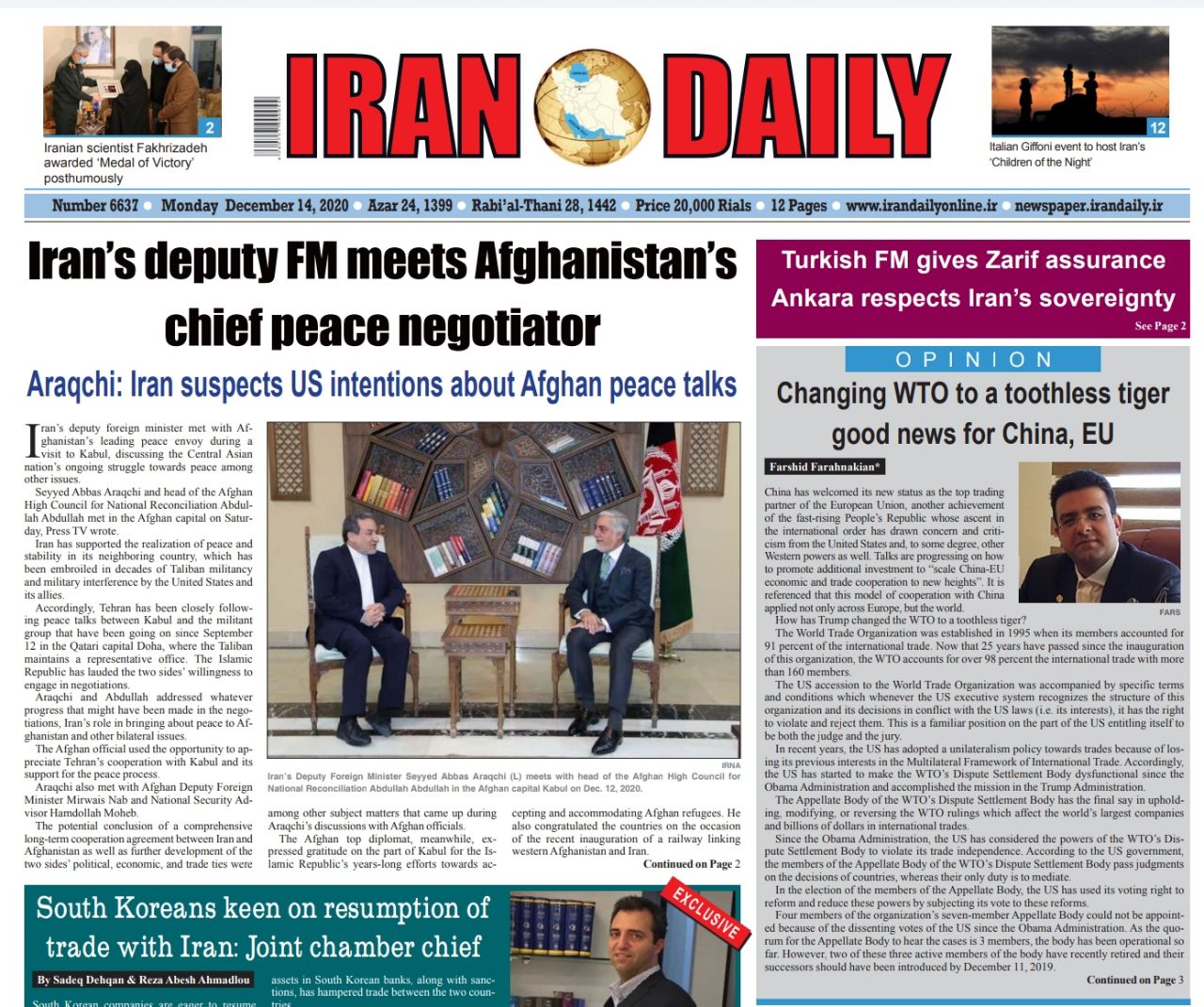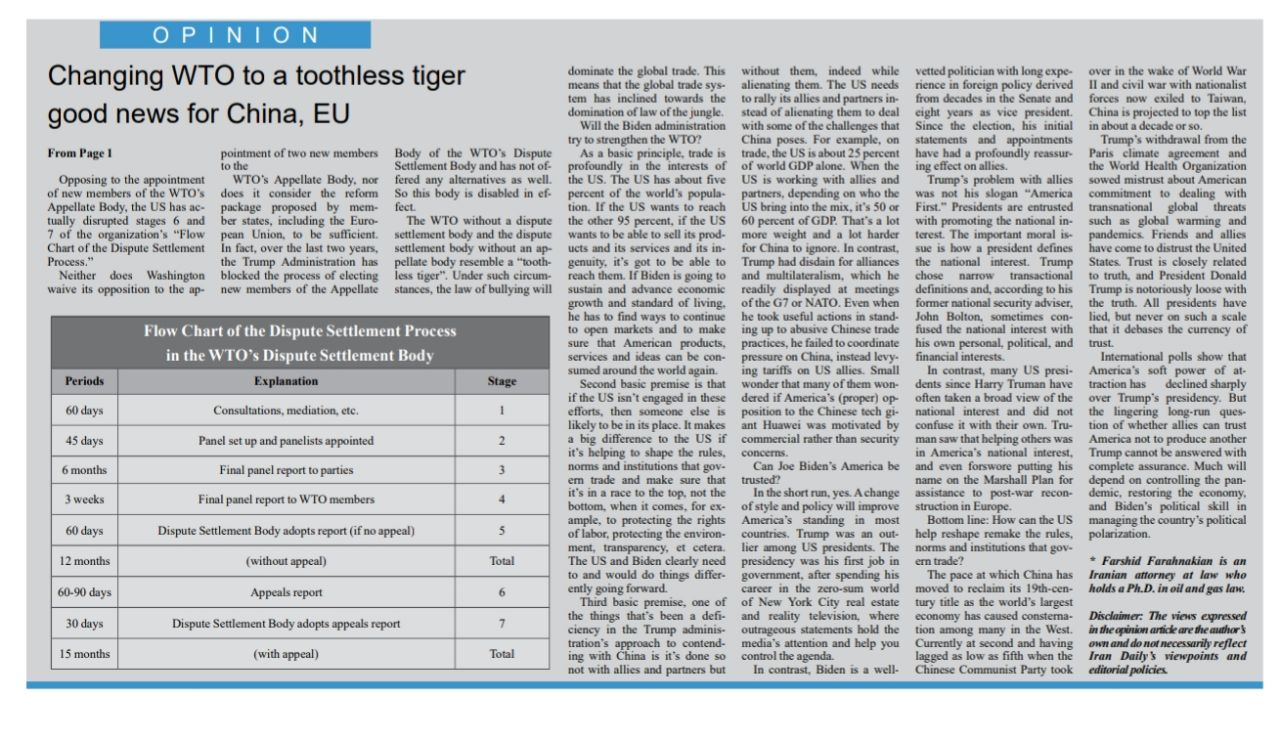Changing WTO to a toothless tiger good news for China, EU
Post Description: This article discusses whether Biden's United States can help to reshape the rules, norms and institutions that govern trade again.
This article was published in December 2020 in Iran Daily newspaper.
Changing WTO to a toothless tiger good news for China, EU


Good news for both China and the EU
China has welcomed its new status as the top trading partner of the European Union, another achievement of the fast-rising People's Republic whose ascent in the international order has drawn concern and criticism from the United States and, to some degree, other Western powers as well. Talks are progressing on how to promote additional investment to “scale China-EU economic and trade cooperation to new heights”. It is referenced that this model of cooperation with China applied not only across Europe, but the world.
How has Trump changed the WTO to toothless Tiger?
The World Trade Organization was established in 1995 when its members accounted for 91% of the international trade. Now that 25 years have passed since the inauguration of this organization, the WTO accounts for over 98% the international trade with more than 160 members.
The US accession to the World Trade Organization was accompanied by specific terms and conditions which whenever the US executive system recognizes the structure of this organization and its decisions in conflict with the US laws (i.e. its interests), it has the right to violate and reject them. This is a familiar position on the part of the US entitling itself to be both the judge and the jury.
In recent years, the US has adopted a unilateralism policy towards trades because of losing its previous interests in the Multilateral Framework of International Trade. Accordingly, the US has started to make the WTO's Dispute Settlement Body dysfunctional since the Obama Administration and accomplished the mission in the Trump Administration.
The Appellate Body of the WTO's Dispute Settlement Body has the final say in upholding, modifying, or reversing the WTO rulings which affect the world's largest companies and billions of dollars in international trades.
Since the Obama Administration, the US has considered the powers of the WTO's Dispute Settlement Body to violate its trade independence. According to the US government, the members of the Appellate Body of the WTO's Dispute Settlement Body pass judgments on the decisions of countries, whereas their only duty is to mediate.
In the election of the members of the Appellate Body, the US has used its voting right to reform and reduce these powers by subjecting its vote to these reforms.
Four members of the organization's seven-member Appellate Body could not be appointed because of the dissenting votes of the US since the Obama Administration. As the quorum for the Appellate Body to hear the cases is 3 members, the body has been operational so far. However, two of these three active members of the body have recently retired and their successors should have been introduced by December 11, 2019.
Opposing to the appointment of new members of the WTO's Appellate Body, the US has actually disrupted stages 6 and 7 of the organization's "Flow Chart of the Dispute Settlement Process."
|
Flow Chart of the Dispute Settlement Process in the WTO's Dispute Settlement Body |
||
|
Stage |
Explanation |
Periods |
|
1 |
Consultations, mediation, etc. |
60 days |
|
2 |
Panel set up and panelists appointed |
45 days |
|
3 |
Final panel report to parties |
6 months |
|
4 |
Final panel report to WTO members |
3 weeks |
|
5 |
Dispute Settlement Body adopts report (if no appeal) |
60 days |
|
Total |
(without appeal) |
12 months |
|
6 |
Appeals report |
60-90 days |
|
7 |
Dispute Settlement Body adopts appeals report |
30 days |
|
Total |
(with appeal) |
15 months |
Neither does Washington waive its opposition to the appointment of two new members to the WTO's Appellate Body, nor does it consider the reform package proposed by member states, including the European Union, to be sufficient. In fact, over the last two years, the Trump Administration has blocked the process of electing new members of the Appellate Body of the WTO's Dispute Settlement Body and has not offered any alternatives as well. So this body is disabled in effect.
The WTO without a dispute settlement body and the dispute settlement body without an appellate body resemble a "toothless tiger". Under such circumstances, the law of bullying will dominate the global trade. This means that the global trade system has inclined towards the domination of law of the jungle.
Will the Biden administration try to strengthen the WTO?
As a basic principle, trade is profoundly in the interests of the US. The US has about 5% of the world’s population. If the US wants to reach the other 95%, if the US wants to be able to sell its products and its services and its ingenuity, it’s got to be able to reach them. If Biden is going to sustain and advance economic growth and standard of living, he has to find ways to continue to open markets and to make sure that American products, services and ideas can be consumed around the world again.
Second basic premise is that if the US isn’t engaged in these efforts, then someone else is likely to be in its place. It makes a big difference to the US if it’s helping to shape the rules, norms and institutions that govern trade and make sure that it’s in a race to the top, not the bottom, when it comes, for example, to protecting the rights of labor, protecting the environment, transparency, et cetera. The US and Biden clearly need to and would do things differently going forward.
Third basic premise, one of the things that’s been a deficiency in the Trump administration’s approach to contending with China is it’s done so not with allies and partners but without them, indeed while alienating them. The US needs to rally its allies and partners instead of alienating them to deal with some of the challenges that China poses. For example, on trade, the US is about 25% of world GDP alone. When the US is working with allies and partners, depending on who the US bring into the mix, it’s 50 or 60% of GDP. That’s a lot more weight and a lot harder for China to ignore. In contrast, Trump had disdain for alliances and multilateralism, which he readily displayed at meetings of the G7 or NATO. Even when he took useful actions in standing up to abusive Chinese trade practices, he failed to coordinate pressure on China, instead levying tariffs on US allies. Small wonder that many of them wondered if America’s (proper) opposition to the Chinese tech giant Huawei was motivated by commercial rather than security concerns.
Can Joe Biden’s America be trusted?
In the short run, yes. A change of style and policy will improve America’s standing in most countries. Trump was an outlier among US presidents. The presidency was his first job in government, after spending his career in the zero-sum world of New York City real estate and reality television, where outrageous statements hold the media’s attention and help you control the agenda.
In contrast, Biden is a well-vetted politician with long experience in foreign policy derived from decades in the Senate and eight years as vice president. Since the election, his initial statements and appointments have had a profoundly reassuring effect on allies.
Trump’s problem with allies was not his slogan “America First.” Presidents are entrusted with promoting the national interest. The important moral issue is how a president defines the national interest. Trump chose narrow transactional definitions and, according to his former national security adviser, John Bolton, sometimes confused the national interest with his own personal, political, and financial interests.
In contrast, many US presidents since Harry Truman have often taken a broad view of the national interest and did not confuse it with their own. Truman saw that helping others was in America’s national interest, and even forswore putting his name on the Marshall Plan for assistance to post-war reconstruction in Europe.
Bottom line: How can the US help to shape the rules, norms and institutions that govern trade again?
The pace at which China has moved to reclaim its 19th-century title as the world's largest economy has caused consternation among many in the West. Currently at second and having lagged as low as fifth when the Chinese Communist Party took over in the wake of World War II and civil war with nationalist forces now exiled to Taiwan, China is projected to top the list in about a decade or so.
Trump’s withdrawal from the Paris climate agreement and the World Health Organization sowed mistrust about American commitment to dealing with transnational global threats such as global warming and pandemics. Friends and allies have come to distrust the United States. Trust is closely related to truth, and President Donald Trump is notoriously loose with the truth. All presidents have lied, but never on such a scale that it debases the currency of trust. International polls show that America’s soft power of attraction has declined sharply over Trump’s presidency. But the lingering long-run question of whether allies can trust America not to produce another Trump cannot be answered with complete assurance. Much will depend on controlling the pandemic, restoring the economy, and Biden’s political skill in managing the country’s political polarization.
.png)